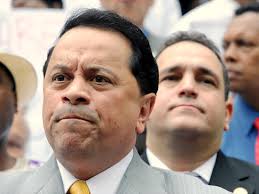By Henry J. Stern
February 10, 2010
"To some extent, the process involves Council Speaker Christine Quinn, who allocated the money among her members."
Yesterday was a red letter day in both political corruption and criminal behavior.. We observed the indictment of Councilman Larry Seabrook for a multitude of crimes over seven years, and the expulsion from the Senate of Hiram Monserrate. Both are noteworthy events.
The Seabrook prosecutor is the United States Attorney for the Southern District of New York, Preet Bharara, who was appointed by President Obama on the recommendation of the senior Senator for New York, Chuck Schumer. Mr. Bharara was born in India and brought to this country as an infant. He is a graduate of Harvard College and Columbia Law School. He worked five years in the U.S. Attorney's office, prosecuting criminal cases against crime families. In 2005 he became chief counsel to Senator Schumer.
The 13-count indictment against the three-term Councilman from the North Bronx covers a multiplicity of alleged sins: larceny, bribery, extortion, money laundering, etc. You can link to it here. Essentially, it accuses Seabrook of selling his office, collecting bribes, and defrauding the city on discretionary funds he received as a councilmember. The scheme was unfolded in charts presented by the U.S. Attorney and his staff.
The breadth of the Seabrook indictment is comparable to the barrage of charges against former Assemblyman Brian McLaughlin of Queens, once thought of as a mayoral contender. McLaughlin pleaded guilty on March 7, 2008 and was sentenced to ten years in prison. Along the way, he gave up a colleague, Queens, Assemblyman Anthony Seminerio, who received a six-year sentence for securing state funds for nonprofits in exchange for cash. He disguised the cash as consulting fees in the style of former Senate Majority Leader Joseph L. Bruno, who was convicted on December 7, 2009 on two counts relating to the sale of a nondescript horse. Bruno is scheduled to be sentenced March 31; he has appealed his conviction to the Second Circuit. McLaughlin and Bernard Madoff, who was not in politics, are both serving time in a Federal prison in North Carolina.
Apart from his guilt or innocence, an issue in the Seabrook case is: who else knew what he was doing, and where was municipal oversight over the spending of discretionary funds? To some extent, the process involves Council Speaker Christine Quinn, who allocated the money among her members. The millions were granted as a reward for Seabrook's political loyalty and reliability as a vote on the Council. Is it surprising that he should apply the same standard to the recipients of the money as were applied to him -- No questions asked? Was there the slightest review by anyone in government over the seven years the scam was operating? (Four of those years were under former Speaker Gifford Miller.) Did Comptroller Thompson ever look at how the city money was being spent?
The more important question is: how many other Councilmembers do what Seabrook did? Councilman Miguel Martinez of Upper Manhattan was caught by Federal prosecutors last year, and pleaded guilty. He is now serving a five-year prison sentence. It is unlikely that these two are the only ones who misused the Council's discretionary funds, although their activities may have been the most egregious. The system now in place makes it far too easy to steal public funds. Who is responsible for tightening procedures? Who does spot checks to see that programs exist? Where is the due diligence? Who is responsible, the mayor, the comptroller, the speaker, the commissioner of investigation? Rule 25-E: "Everybodys job is nobody's job."
Monserrate is a different story. His offenses were not committed on the job, and did not involve defrauding the city. He allegedly slashed his girlfriend with a broken glass, and took 40 minutes in a car to find a remote hospital to which he could take her, after dragging her out of his apartment house. He waived his right to a jury trial, so the case was heard by Judge William Erlbaum, who acquitted him of felony assault but convicted him of misdemeanor assault because the dragging was caught on videotape. The victim told the emergency room doctor that Monserrate had slashed her. She later recanted her accusation, whether out of compassion, calculation or desire. Her story at the trial was that she had clumsily fallen on the broken glass, a frequent tale in cases of domestic violence. Judge Erlbaum said, pointedly: "There are two types of not-guilty findings. One is innocence, the other is not proven -- these counts were not proven."
Conviction of a felony results in automatic expulsion from the legislature. Many of his colleagues believed that he had committed a felony, and they were imposing the penalty that the judge decided not to because he felt the slashing was not proven beyond a reasonable doubt. It seems to us that people very rarely fall to the floor on their own and slash their faces on freshly-broken glass while arguing with their lovers.
Be that as it may, we believe that a large factor in Monserrate's expulsion was his political disloyalty to both Republicans and Democrats. By following Pedro Espada and deserting his caucus for personal advantage in the June 8 coup, and then bouncing back a week later to rejoin the Democrats (thus leaving neither side with a majority) Monserrat managed to betray both parties in the Senate. Rule 25-W: "What goes around, comes around."
The situation is comparable to that faced by Governor Spitzer, who was pursued by Federal authorities and found himself facing impeachment and removal from office, basically for consensual sex with an upscale prostitute--who is now a Post columnist on affairs of the heart. Spitzer was forced to resign in March 2008 because legislators of both parties could not stand him, because of his ill temper, inconsistency, and intemperate behavior, including threats and personal abuse. His intrigue against Senator Bruno, his evasions on the subject, and his attempt to blame staff showed lack of character. His tawdry role as Client No. 9 gave his colleagues the excuse they desired to trade him in for Lieutenant Governor Paterson. It is not a Rule, but it is apropos that answered prayers cause more tears than unanswered ones.
Whether they would have acted as they did if they knew what would transpire is an unanswerable question. It would certainly have made the Assembly's deliberations more complex. But at the time, Paterson was a relatively unknown quantity, having spent twenty years in the Senate without generating much notice. His peaceable nature led to the belief that, with him, there would be more comity between the executive and legislative branches of government. That turned out to be a serious error.
One note on the recent rumor mill contretemps. We do not blame The New York Times, which has not (as of the day of the blizzard) published a word about the governors private life. It is curious that the Executive Chamber was silent for three days as the rumors swelled. On the other hand, so much in Albany is bizarre, and so much of the rest is bathetic, that no one should be particularly surprised any more by anything they do or fail to do.
One thing Albany is clearly not doing is dealing realistically with the budget crisis. When the state runs out of cash, can no longer borrow, and is unable to meet payroll, this issue will get the public attention it deserves. Of course, if the governor and legislature had acted when they were warned years go, the situation would not be as acute as it is today.
Watching Albany is like watching a stock on the market slide downward, in fits and starts, but at increasing velocity. One wonders when it will hit bottom. Who knows what outside forces will be needed to come to the rescue? Will the cavalry arrive, and what price will we have to pay for their help? Together, we will watch.

 When did the NYT learn about the allegations of Paterson and the State Police intervention in a domestic violence case involving his trusted aid David Johnson? Since the heart of this story seems to have been dropped in the NYT hands by the lawyer of the woman who said she as abused, w
When did the NYT learn about the allegations of Paterson and the State Police intervention in a domestic violence case involving his trusted aid David Johnson? Since the heart of this story seems to have been dropped in the NYT hands by the lawyer of the woman who said she as abused, w
 hy did the NYT dip this story out? Did the WH and Sharpton and other Dem leaders work with the NYT to get Paterson out? Was the get out today an offer he could not refuse? The only way Paterson could avoided a criminal investigation of jury tampering?
hy did the NYT dip this story out? Did the WH and Sharpton and other Dem leaders work with the NYT to get Paterson out? Was the get out today an offer he could not refuse? The only way Paterson could avoided a criminal investigation of jury tampering?  NYS Police New Logo The State Police superintendent, Harry J. Corbitt, said on Wednesday that the State Police had “never pressured” the woman not to press charges against Mr. Johnson. He also said the State Police routinely made such contacts when an incident concerned a high-profile person, even one who is not a government official, “that might involve a media even End of the World As We Know it
NYS Police New Logo The State Police superintendent, Harry J. Corbitt, said on Wednesday that the State Police had “never pressured” the woman not to press charges against Mr. Johnson. He also said the State Police routinely made such contacts when an incident concerned a high-profile person, even one who is not a government official, “that might involve a media even End of the World As We Know it 













